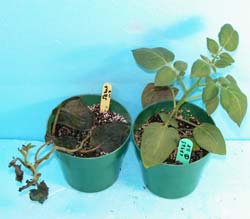
Scouring the genome of a wild Mexican potato, scientists have discovered a gene that protects potatoes against late blight, the devastating disease that caused the Irish potato famine.
The discovery of the gene and its cloning by scientists at the University of Wisconsin-Madison was reported today (July 14) in online editions of the Proceedings of the National Academy of Sciences (PNAS).
The identification of the gene, found in a species of wild potato known as ´ Solanum bulboca

A group of leading U.S. public sector agricultural research institutions has agreed to allow access to each other’s current and future patented agricultural technologies and is exploring ways to ensure that new licensing agreements allow for technologies to be used to fight global hunger and to boost the domestic agricultural sector.
The agreement will accelerate research and development to improve staple crop varieties like rice, cassava, sorghum and potatoes essential to resource-poor fa

Space data are set to become an added ingredient in future European wines. ESA is contributing Earth Observation data and expertise to a European Commission-backed project called Bacchus.
The aim is to chart the continent’’s vineyards in unprecedented detail, and provide vine growers with information tools to improve production management and guarantee grape quality.
From Bordeaux to Frascati, there is good reason why wines are always known for their home region. As any connoi

Researchers are studying rice genes as a model to understand germination
Weeds flourish in agricultural, urban, and natural settings because they have certain characteristics, such as seed dormancy, that provide for their persistence. Dormant weed seeds in the soil avoid exposure to control practices that target emerging weed seedlings.
Scientists from the USDA-Agricultural Research Service and North Dakota State University, Fargo, ND, are focusing their research on underst

When ten Eastern European countries join the EU next year, internal trade will increase and the structures of the agricultural and food sectors will change in both old and new Member States. This was the message of JOHAN SWINNEN, Professor of Agricultural Policy of the Katholieke Universiteit Leuven in Belgium, addressing delegates at the opening of the Nordic Association of Agricultural Scientists (NJF) congress in Turku, Finland, last Tuesday. Swinnen is one of the world’s leading experts on the Ag

The flatulent side-effects of eating beans could soon be reduced by naturally fermenting the beans, according to results to be published in the July issue of the SCI’s Journal of the Science of Food & Agriculture, now available online.
Flatulence is known to be caused when bacteria in the gut break down alpha galactosides and soluble dietary fibre, producing gases as a by-product. Untreated beans contain high levels of these compounds.
Many people are put off eating beans because th